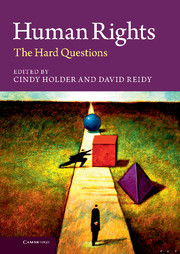Book contents
- Frontmatter
- Contents
- Figure
- List of table
- Notes on contributors
- Introduction
- Part I What are human rights?
- Part II How do human rights relate to group rights and culture?
- Part III What do human rights require of the global economy?
- Part IV How do human rights relate to environmental policy?
- Part V Is there a human right to democracy?
- 14 Is there a human right to democracy?
- 15 The human right to democracy and its global import
- 16 An egalitarian argument for a human right to democracy
- Part VI What are the limits of rights enforcement?
- Part VII Are human rights progressive?
- Index
- References
14 - Is there a human right to democracy?
Published online by Cambridge University Press: 05 May 2013
- Frontmatter
- Contents
- Figure
- List of table
- Notes on contributors
- Introduction
- Part I What are human rights?
- Part II How do human rights relate to group rights and culture?
- Part III What do human rights require of the global economy?
- Part IV How do human rights relate to environmental policy?
- Part V Is there a human right to democracy?
- 14 Is there a human right to democracy?
- 15 The human right to democracy and its global import
- 16 An egalitarian argument for a human right to democracy
- Part VI What are the limits of rights enforcement?
- Part VII Are human rights progressive?
- Index
- References
Summary
Introduction
An intriguing episode in the life of the now-defunct United Nations (UN) Commission on Human Rights was its adoption of a series of resolutions on human rights and democracy. In 1999 the Commission adopted a resolution entitled “Promotion of the right to democracy” (CHR Res. 1999/57), in anticipation of the new century and millennium. The resolution endorsed a “right to democratic governance” as including a range of civil and political rights such as those to freedom of expression, thought and association. It also included the rights of “universal and equal suffrage,” free voting procedures, periodic and free elections and “the right of citizens to choose their governmental system through constitutional or other democratic means.” The resolution was introduced by the United States and co-sponsored by almost all 53 members of the Commission. Cuba moved an amendment to the draft to delete the words “the right to” from the title of the resolution, on the grounds that no such right existed, but this failed to garner majority support. In the end, the resolution was adopted without a negative vote, but with China and Cuba abstaining.
This was the only occasion on which the Commission, the major UN forum for human rights development, endorsed a specific right to democracy. Later resolutions avoided this language and addressed the relationship between the concepts of human rights and democracy, which became a lightning rod for North–South tensions in the Commission. Some of the subsequent resolutions endorsed the process of democratization of states, focusing on democracy at the national level. They presented “free and fair elections [as] an essential feature of democracy” (e.g., CHR Res. 2001/41). These resolutions were typically supported by the United States, the United Kingdom and Canada as well as some developing states, while states such as China, Cuba, Saudi Arabia and Syria would abstain from voting.
- Type
- Chapter
- Information
- Human RightsThe Hard Questions, pp. 271 - 284Publisher: Cambridge University PressPrint publication year: 2013
References
- 5
- Cited by

